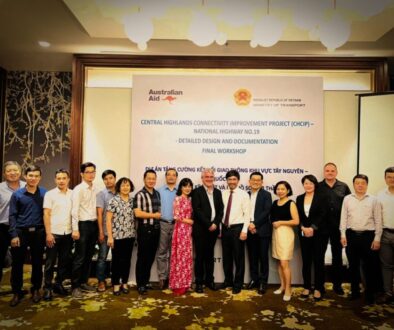Addressing Social and Environmental Considerations in Transport Infrastructure Projects
IN BRIEF
Vietnam Inland Waterways Administration (VIWA) has made big progress on the activity “Environmental and Social Benefits and Costs of Transport Infrastructure Projects” (ESIA). After more than two years of intense research and development, and with the close support of Aus4Transport, VIWA has recently issued its Sector Standards (TCCS) to ensure inland-waterway infrastructure projects comply with and support environmental and social requirements set by the Government of Vietnam. In the same line, the Vietnam National Railway Authority (VNRA) and the Directorate for Roads of Vietnam (DRVN) are expected to issue their TCCSs during September 2022.
The three sets of Sector Standards, one for each sub-sector, provide comprehensive guidelines on how to undertake environmental and social impact assessments, and ensure there is a fair balance between economic development and socio-environmental protection in all transport infrastructure projects in Vietnam.
KNOW MORE…
Traditionally, transportation efficiency concerns are primarily focused on route optimisation, capacity planning, and partner collaboration. Today, priorities have shifted, and the focus stands around improving services, reducing operating costs and minimising environmental and social impacts. The development of green transport infrastructure and systems is an increasing strategic target for many countries and is a key element to harmonising economic efficiency and social and environmental sustainability objectives. Adopting green and socially inclusive practices has many long-term benefits, such as cost savings, reducing CO2 emissions, and protecting health.
Environmental protection continues to be a core value in all projects and development strategies of the Australian Government. Aus4Transport, the transport infrastructure initiative of the Government of Australia in Vietnam thoroughly integrates environmental solutions in all its proposed activities. The “Environmental and Social Benefits and Costs of Transport Infrastructure Projects” (ESIA) activity is another example of how mainstreaming social safeguards is a priority for the Australian and Vietnamese governments. The ESIA Sector Standards provide concrete guidelines for the assessment of environmental and social impacts associated with transport infrastructure, ensuring the issues are considered and addressed during the implementation of all future projects.
The Sector Standards adapt international good practice to the Vietnamese context, enabling a streamlined process that increases efficiency and effectiveness of project preparation, provides environmental and social benefits, and optimises transport investment benefits for Vietnam. The agreed international ESIA practices to be applied to Ministry of Transport projects mainly focus on:
- Assessment and Management of Environmental and Social Risks and Impacts
- Resource Efficiency and Pollution Prevention and Management
- Community Health and Safety
- Land Acquisition, Restrictions on Land Use and Involuntary Resettlement
- Biodiversity Conservation and Sustainable Management of Living Natural Resources
- Cultural Heritage
- Stakeholder Engagement
- Climate Change Adaptation
The development of the Sector Standards is the result of the commendable effort of all related parties. Their development required a wide variety of activities, such as conducting different appraisals to understand the current context and establish existing knowledge, surveying skills and competencies within relevant MOT units, providing training to transport professionals, organising workshops, and iteratively developing several versions based on recurrent feedback.
The application of the Sector Standards by DRVN, VNRA and VIWA will mark a significant milestone for sustainable project management in the Vietnamese transport sector. The Technical Guidelines will enhance the ability of senior officials to identify and analyse potential risks to the environment and involved communities. As such, the TCCS will be crucial to developing suitable measures to mitigate the negative impacts of transport infrastructure projects.
Aus4Transport, together with the Department of Environment and the involved sub-sector administrations, are very proud of the achievements of this activity and look forward to seeing the Standards successfully implemented on all transport projects. The finalisation of the Sector Standards marks a significant milestone on the Program’s efforts to support Vietnam achieve the Sustainable Development Goals.




